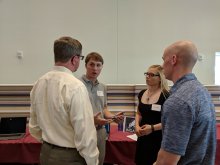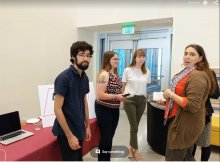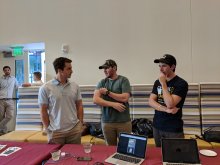The winning team for this year's Backers and Hackers is Tiffany Abernathy, Cayla Przygoda, Jaime Areheart (Backer) for their app GamersCentral, an app for gamers to get connected and discover new games. Backers and Hackers is a completely student-run initiative organized by the Entrepreneurship Club and the College of Engineering and Computing at USC. The program brings together Columbia’s entrepreneurial community and USC’s mobile app development students to transform app ideas into reality.
Second place went to Jared Gentry, Brian Griffin, and Landon Sanford (Backer) for their app 2Q, a live streaming game app that is a merge between HQ Trivia and The Bachelor, where a weekly show allows a bachelorette/bachelor to find a winner based on questions that narrow people down based on comparability, and the winning pair is offered a prize to go on a date or throw a party with a bar tab.
Third place to James Chaszar, Daniel Berry, Alexander Rusnak, and Nicole Westley(backer) for their app InGate, a horse show management app that makes for easy and instant communication between the managers of the event and the competitors and coaches. Backers&Hackers are co-organized by CSCE546, a mobile app development course at the Department of Computer Science & Engineering. The apps are developed as the final projects for the course. We are always looking for clients/backers and app ideas as final projects for next year's course . If you want an app built for you, for free, or want to collaborate with app development, please contact Dr. Hu (jianjunh A.T sc.edu)




